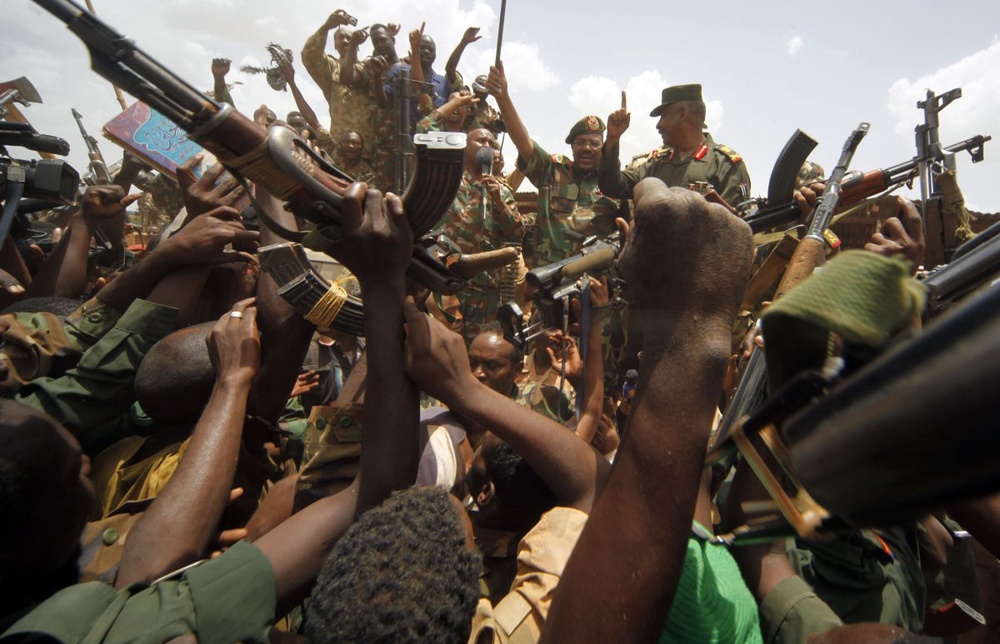
"Armed groups" from South Sudan clashed with Arab tribesmen in Samaha, a flashpoint border region disputed by Khartoum and Juba, AFP reports citing the Sudanese military. The fighting occurred two days ago, army spokesman Sawarmi Khaled Saad told AFP. "We hear that there were some groups from South Sudan, armed groups... and they attacked the nomads there, the Rezeigat," he said. "The fighting was not between the Sudanese army and the South Sudanese army." He said he had no information on casualties and added: "We are trying to find a political solution for this problem." In comments to the official SUNA news agency Saad said land mines had been planted by South Sudanese forces in the Samaha area, leading people there "to enter into clashes with the armed groups affiliated to the South Sudan army." The Samaha region is one of five areas disputed by Khartoum and the South's government in Juba. In November, Sudan's army said it attacked an area several kilometres (miles) north of Samaha where Darfur rebels had set up a compound, but South Sudan said bombs landed on its territory, killing civilians. Sudan considers the area, around the Bahr al-Arab River, to be part of its East Darfur state. This week's clash came as Sudan and South Sudan try to implement stalled economic and security deals -- including a demilitarised border buffer zone -- which they hailed in September as ending conflict after they fought along their undemarcated border in March and April. Sudan's President Omar al-Bashir and Ethiopian Prime Minister Hailemariam Desalegn on Wednesday evening "discussed means of implementing the agreements which were signed in Addis Ababa between Sudan and South Sudan... as well as removing the impediments", SUNA reported. It added that Bashir affirmed his readiness to meet South Sudan's President Salva Kiir "in any time and place" to speed up the deals reached in the Ethiopian capital after African Union mediation. Desalegn was heading on Thursday to South Sudan after his one-day stop in Khartoum, SUNA said. Along with the buffer zone, the September pacts allowed for a resumption of South Sudanese oil exports through northern pipelines. They also said border points would be reopened for general trade. Khartoum accuses South Sudan of supporting rebels operating in Sudan, which has been a major obstacle to implementing the agreements. The South, in turn, says Sudan backs insurgents on southern territory. Separately, Sudan and South Sudan still need to reach a deal on the final status of the Abyei region, as well as on Samaha and other disputed points along the frontier. South Sudan separated in July 2011 under a peace agreement that ended a 1983-2005 civil war.





"Armed groups" from South Sudan clashed with Arab tribesmen in Samaha, a flashpoint border region disputed by Khartoum and Juba, AFP reports citing the Sudanese military.
The fighting occurred two days ago, army spokesman Sawarmi Khaled Saad told AFP.
"We hear that there were some groups from South Sudan, armed groups... and they attacked the nomads there, the Rezeigat," he said. "The fighting was not between the Sudanese army and the South Sudanese army."
He said he had no information on casualties and added: "We are trying to find a political solution for this problem."
In comments to the official SUNA news agency Saad said land mines had been planted by South Sudanese forces in the Samaha area, leading people there "to enter into clashes with the armed groups affiliated to the South Sudan army."
The Samaha region is one of five areas disputed by Khartoum and the South's government in Juba.
In November, Sudan's army said it attacked an area several kilometres (miles) north of Samaha where Darfur rebels had set up a compound, but South Sudan said bombs landed on its territory, killing civilians.
Sudan considers the area, around the Bahr al-Arab River, to be part of its East Darfur state.
This week's clash came as Sudan and South Sudan try to implement stalled economic and security deals -- including a demilitarised border buffer zone -- which they hailed in September as ending conflict after they fought along their undemarcated border in March and April.
Sudan's President Omar al-Bashir and Ethiopian Prime Minister Hailemariam Desalegn on Wednesday evening "discussed means of implementing the agreements which were signed in Addis Ababa between Sudan and South Sudan... as well as removing the impediments", SUNA reported.
It added that Bashir affirmed his readiness to meet South Sudan's President Salva Kiir "in any time and place" to speed up the deals reached in the Ethiopian capital after African Union mediation.
Desalegn was heading on Thursday to South Sudan after his one-day stop in Khartoum, SUNA said.
Along with the buffer zone, the September pacts allowed for a resumption of South Sudanese oil exports through northern pipelines. They also said border points would be reopened for general trade.
Khartoum accuses South Sudan of supporting rebels operating in Sudan, which has been a major obstacle to implementing the agreements.
The South, in turn, says Sudan backs insurgents on southern territory.
Separately, Sudan and South Sudan still need to reach a deal on the final status of the Abyei region, as well as on Samaha and other disputed points along the frontier.
South Sudan separated in July 2011 under a peace agreement that ended a 1983-2005 civil war.


 +7 (777) 001 44 99
+7 (777) 001 44 99















































